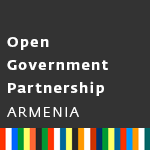Statistic and graphs
Commitments by action plans and statuses
Armenia is currently implementing 11 commitments from their 2018-2020 action plan. This action plan features commitments related to public services, beneficial ownership, transparency, information on local government, and electronic petitions.
Check out this guide for a one-stop shop of the best current resources on how open government projects and approaches can support tackling the pandemic.
ADB and OGP are hosting an innovation challenge to explore how digital technology can be leveraged to strengthen the monitoring of COVID-19 related spending and improve feedback and grievance redressal mechanisms.
Global Gender Gap Index
The Global Gender Gap Report was first published in 2006 by the World Economic Forum. The report covers 153 countries. The Global Gender Gap Index is an index designed to measure gender equality. The index is designed to "measure gender-based gaps in access to resources and opportunities in countries rather than the actual level of the available resources and opportunities in those countries." The methodology used to determine index scores is designed in such a way as to count situations in which men are disadvantaged relative to women as "equal".
E-Government Survey Index
The United Nations E-Government Survey is produced every two years by the Department of Economic and Social Affairs. It is the only report in the world that assesses the e-government development status of all United Nations Member States. It serves as a tool for decision-makers to identify their areas of strength and challenges in e-government and to guide e-government policies and strategies. The publication also highlights emerging e-government trends, issues, and innovative practices, as well as challenges and opportunities of e-government development.
Freedom in the World Index
Freedom in the World is a yearly survey and report by the U.S.-based non-governmental organization Freedom House that measures the degree of civil liberties and political rights in every nation and significant related and disputed territories around the world. It produces annual scores representing the levels of political rights and civil liberties in each state and territory, on a scale from 1 (most free) to 7 (least free). Depending on the ratings, the nations are then classified as "Free", "Partly Free", or "Not Free".
Gross domestic product (GDP)
Gross domestic product (GDP) is the monetary value of all finished goods and services made within a country during a specific period.GDP is often used as a metric for international comparisons as well as a broad measure of economic progress. It is often considered to be the "world's most powerful statistical indicator of national development and progress".
Doing Business Index
The ease of doing business index is an index created jointly by three leading economists at the World Bank Group. Higher rankings (a low numerical value) indicate better, usually simpler, regulations for businesses and stronger protections of property rights.
Corruption Perception Index
The Corruption Perceptions Index (CPI) is an index that ranks countries "by their perceived levels of public sector corruption, as determined by expert assessments and opinion surveys. The index is published annually by the non-governmental organization Transparency International since 1995. The Index is usually publishing in January, and currently ranks 180 countries "on a scale from 100 (very clean) to 0 (highly corrupt)".
